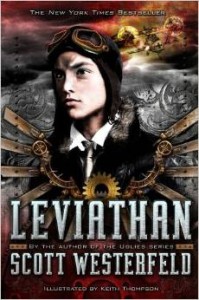Leviathan, by Scott Westerfield, illustrations by Keith Thompson. Simon Pulse, 2009, 434 pages plus historical note.
Reading Level: Young Adult, ages 12-15
Recommended for: Ages 12-14 and up
One-line Summary: Leviathan and its two sequels take middle grade and YA readers on a thrill ride to an alternative 1914 Europe in a bid to stop World War I.
August 1914: Prince Aleksander is staying at the family hunting lodge while his parents, Archduke Franz Ferdinand and Princess Sophie, are visiting Sarajevo. Suddenly and without ceremony, Count Volger, Alek’s fencing master, and Otto Klopp, chief mechanic, announce a surprise moonlight expedition in the stormwalker, a war machine Alek is learning to pilot. Meanwhile, in London, a Scottish lass is cramming to pass the entrance exam for the Royal Air Navy. Deryn Sharp will also have to pass a boy, with the help of her brother, because society has not kept pace with technology and women are not allowed to serve on board the airships. But she distinguishes herself enough in training exercises to earn a midshipman’s berth aboard one of the Navy’s most technically advanced aircraft. This is the Leviathan, a huge whale-like airship headed for Constantinople on a secret mission. The mission involves the delivery of some large mysterious eggs—a new Darwinian fabrication, perhaps? That’s what the Brits have excelled at, ever since old Darwin learned the secret of life-lines (DNA) and how to cut and splice organic life to suit any purpose: “umpteen different beasties made up the Leviathan, from the microscopic hydrogen-farting bacteria in its belly to the great harnessed whale itself. The airship’s creatures, like the rest of nature, were always struggling among themselves in messy, snarling equilibrium.”
The “clanker” powers (Germans and their allies) have funneled all their energies into machines: ironclads, walking tanks, many-legged traveling forts. They regard the Darwinist fabrications as “godless.” Most nations of the world have adopted either Darwinist or clanker technologies (though the Americans experiment freely with both), and the escalation of invention between rivals is bound to break out in open combat sooner or later. The Leviathan is barely underway when word comes of an assassination in Sarajevo. Archduke Franz Ferdinand has been murdered, along with his wife. Since the Archduke is heir to the Hapsburg Empire, this means war! It also means that Alek is now key to the very fortunes of Europe: if the Germans find him, he’s toast; if he can escape to safety, he might be in a position to stop the war. He and Deryn fatefully meet at a mountain fortress in Switzerland and slowly get to know and appreciate each other. On the unlikely friendship between these teenagers will hang the fortunes of empires—and what teenage reader could resist a premise like this?
Though the key concepts break down if you think about them too hard, the steampunk world of Leviathan is fully realized and raises some interesting questions. On science: does one discovery lead sure as sunrise to the next, or can science take the same circuitous paths that history does? On history: what really started World War I (and were the Germans to blame)? On ethics: if the Darwinists have discovered how to manipulate lower formers of life, what’s to stop them from eventually manipulating human life? On linguistics: What’s a “boffin”? The two central characters show believable growth and change over the course of the series (which leads them to Istanbul and then to America), Alek slowly becoming a leader of men and Deryn developing a softer side. Overall, and with some cautions, these are well-written, entertaining and sometimes thought-provoking excursions into human imagination. Does the series glorify Darwinism? I doubt it; Westerfeld isn’t proselytizing, he’s just having fun. But might there be a link between an author’s joy in a fictional world, and God’s joy in the real one? Our imagination is a pale imitation of God’s: after all, He creates from nothing, while we must work from his originals. But He’s given us so much to work with, and fertile brains besides: a good story is a pleasure both to read and to write, and one of His many blessings. The illustrations by Keith Thompson (many of them full page, with captions) are more than an asset.
Cautions: Worldview (Darwinism), Language (some use of vulgar–and made-up–words by Deryn; Alek’s oath of “God’s wounds!” even though he’s the most religious character of the series)
Overall rating: 3.75
- Worldview/moral value: 3.5
- Artistic value: 4
*Discussion Questions:
- Read Job 39-42 and note how each creature described rejoices in being itself–especially the Leviathan! How does this differ from the organisms created by the Darwinists?
- E. M. Forester is quoted as saying, “If I had the choice between betraying my country and betraying my friend, I hope I would have the guts to betray my country.” Several times in the series, Alek and Deryn’s loyalty to each other appears to override their duties to country. It seems to work out for the good of all, but how do you react to Forester’s statement, and does it have any application to Leviathan?
<iframe sandbox="allow-popups allow-scripts allow-modals allow-forms allow-same-origin" style="width:120px;height:240px;" marginwidth="0" marginheight="0" scrolling="no" frameborder="0" src="//ws-na.amazon-adsystem.com/widgets/q?ServiceVersion=20070822&OneJS=1&Operation=GetAdHtml&MarketPlace=US&source=ss&ref=as_ss_li_til&ad_type=product_link&tracking_id=redeemedreade-20&language=en_US&marketplace=amazon®ion=US&placement=1416971742&asins=1416971742&linkId=cd48d46d3513310537ad965d70d8411f&show_border=true&link_opens_in_new_window=true"></iframe>Support our writers and help keep Redeemed Reader ad-free by joining the Redeemed Reader Fellowship.
Stay Up to Date!
Get the information you need to make wise choices about books for your children and teens.
Our weekly newsletter includes our latest reviews, related links from around the web, a featured book list, book trivia, and more. We never sell your information. You may unsubscribe at any time.
We'd love to hear from you!
Our comments are now limited to our members (both Silver and Golden Key). Members, you just need to log in with your normal log-in credentials!
Not a member yet? You can join the Silver Key ($2.99/month) for a free 2-week trial. Cancel at any time. Find out more about membership here.


